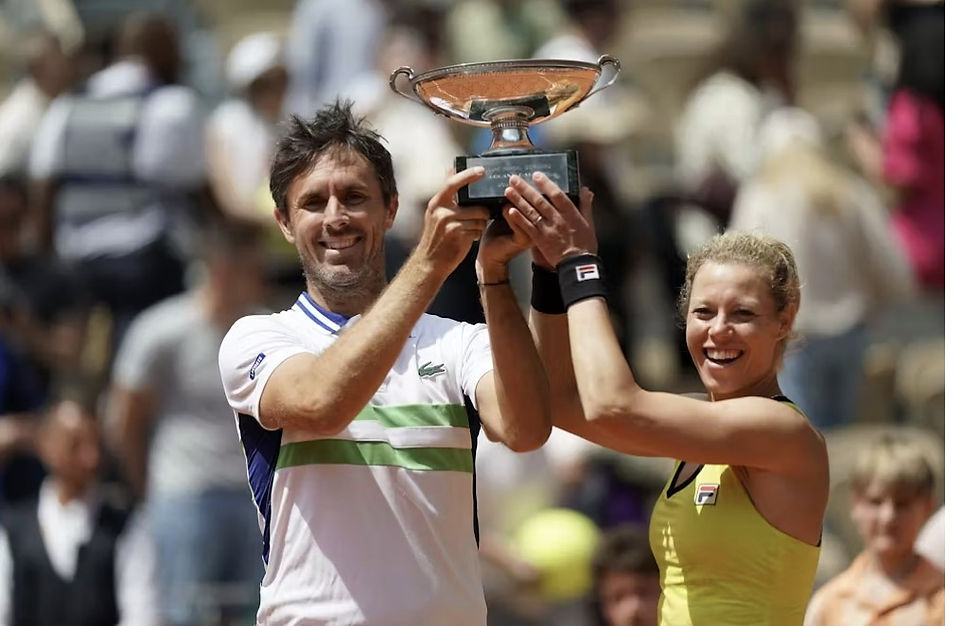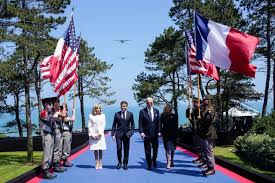Swiatek's a hat-trick queen and the Spanish prince ascends to the Spanish clay throne
- lydiajulian1
- Jun 10, 2024
- 6 min read
Updated: Jun 14, 2024
Two Grand Slams down. Two to go. The first is Wimbledon, the Grand Slam that is primus inter pares. Yet the sound and fury of politics threatens to be a racket that will eclipse its traditional prominence and focus. Britons go to the polls on the Thursday of Wimbledon’s first week. Today we find out that the French are heading to the polls on June 30 and July 7, Wimbledon’s first weekend.
Before the cross-channel campaigning us waylays us, let us remember what has just happened in Paris.
Although relations between Australia and France have soured since Australia reneged on their submarine contract there is at least symmetry between the nations’ tennis courts in 2024.
The Women’s finals at both the Australian and French Open were won in ridiculously short time by dominant defending champion against surprise finalists: Sabalenka over Zheng 6-3 6-2; Swiatek over Paolini 6-2 6-1.
Swiatek has now won a hat-trick of French titles. She heads to Wimbledon seeking to be the first woman to win Wimbledon after winning the French since Serena Williams beat sister, Venus, in both finals in 2002.
The Men’s finals at both events were five set encounters, each extending beyond four hours. For each champion it was a first. Jannik Sinner’s first ever Grand Slam title, defeating Medvedev 3-6 3-6 6-4 6-4 6-3. For Carlos Alcaraz victory meant he won his first French title defeating Zverev 6-2 2-6 5-7 6-1 6-2. Alcaraz is the youngest male player to have won 3 Grand Slam titles on each of clay, grass and hardcourt. Remarkably, he has won all his 3 Grand Slam final appearances.
It is the first time since 2003 that we approach Wimbledon with neither the Australian nor French Opens having been won by one of Federer, Djokovic or Nadal.
Djokovic was the last of the pantheon standing in Paris with an opportunity to maintain this extraordinary run. In the end, Novak Djokovic was his own nemesis, or should that be “kneemesis”? A torn meniscus prevented him from playing his quarter-final against Casper Ruud. Djokovic, however, was still able to claim another milestone, despite his aborted campaign. His fourth-round victory was a record 370th Grand Slam victory, moving past Roger Federer's 369. Serena Williams leads the female tally on 365.
If Djokovic is unable to play at Wimbledon, and we do hope his injections and anaesthetics for his knee surgery met with his organic approval, it will be the first year since 1998 that the tournament will be sans Djokovic, Federer and Nadal.
This truly is a generational moment. Wimbledon 1998: Princess Diana only departed for less than a year, Tony Blair in the first year of his Prime Ministership, John Howard his second. Helmut Kohl was in his last months as Germany’s Chancellor. Jacques Chirac, a former Mayor of Paris, was France’s conservative President. Australia did not have a GST. Bill Clinton was weathering various storms.
Not one of the following Australian Prime Ministers- Kevin Rudd, Julia Gillard, Tony Abbott, Malcolm Turnbull and Scott Morrison- had entered Parliament. Anthony Albanese had in March 1996 and remains the only sitting member.
Since those long ago days all Grand Slam tournaments have successfully introduced ‘Hawkeye’ line technology, except the French. Vive la difference, indeed! Although the technology exists, it is maintained that the clay surface makes possible a degree of error that is not found on grass or hardcourt surfaces. Whatever the degree of error, surely it is less infuriating than the courtside conferences between chair umpires and players that perpetually interrupt games?
The second week of the tournament did, thankfully, produce sunnier skies. It was also the week that world leaders gathered not at Roland Garros, but at Normandy’s beaches to commemorate the 80th anniversary of the D-Day landings.
Many matches still went late into chilly nights during the second week, with many players almost greeting the dawn a la Normandy. Zverev played many of these and was on court for close to twenty hours before the final. Beginning his match against Alcaraz, Zverev appeared somewhat dazed to be playing in daylight. He quickly lost the first set, before surging to win the second and third sets, before being outplayed by a bolder and more adventurous Alcaraz.
Did Zverev pay the Shakespearean price for deposing King Nadal in the first round, only to be usurped in his quest for a first Grand Slam title by the new Spanish Prince?
Given the significance of the D-Day commemorations there were many ironies being played out at Roland Garros. The Men’s final saw a contest between a Spaniard and a German. 80 years ago, America and her allies were helping France end any chance of being dominated by the then Fascist axis of Germany and Spain. Germany was liberated from Hitler, but Spain remained under General Franco’s diktat until 1975. The only legacy of Franco’s despotism is the continued success of Real Madrid in the European Champions League.
Another Fascist threat to France in 1944 was Italy. Eighty years later Italians had their most successful assault on the French Open. Italian players reached the finals of the Men’s and Women’s Doubles and the Women’s singles and the semi-finals of the Men’s Singles. As in 1944, none were able to claim victory. There are, however, always consolations. Jannik Sinner today becomes the first Italian player to claim the No.1 World ranking. Also reaching a personal high is Australia’s Alex de Minaur. His first ever quarter-final appearance at the French Open has propelled him to a career high No.9.

France could claim a scintilla of success at Roland Garros with Eduard Roger Vasselin teaming with Germany’s Laura Sigemund to win the Mixed Doubles title. Coco Gauff flew the flag for America winning the Women’s Doubles title after losing her Singles’ semi-final to Swiatek. Gauff’s partner was Katerina Siniakova of Czechia, a land that, like Swiatek’s Poland, was under Nazi rule in 1944.


Appropriately, much was said at the D-Day commemorations about their legacy. It was a mission designed to enlarge freedom and democracy.
How poignant that the world needed reminding of this lofty ambition when the power and appeal of democracy seems to be reducing. India has returned a minority government against a backdrop of a sectarian election campaign. South Africa still waits to see whether a stable coalition government can be formed after its recent general election.
England’s Prime Minister, Rishi Sunak, reduced all the political capital that he might have gained by attending the D-Day commemorations by returning prematurely to the campaign trail in England. There is every chance that Sunak’s Conservative party may be reduced to a rump of an Opposition, swamped by an electoral tsunami generated by a resurgent Labour Party and Nigel Farage’s populist, nationalist Reform UK Party. Similarly, President Macron fears that the democratic culture of France will be sabotaged by a strong showing by Marine Le Pen’s National Rally Party.
Mexico has elected its first female President, Claudia Sheinbaum, in a landslide electoral victory. Her life is not unconnected to D-Day. Her Jewish maternal grandparents immigrated to Mexico from Bulgaria fleeing the Nazis. President Sheinbaum had an illustrious career as a scientist before delving into politics. Her paternal grandparents hailed from Lithuania. She will have her work cut out trying to combat the pernicious influence of her nation’s drug cartels.

In Australia political unity has frayed as growing numbers of Australians sense a reduced ability to manage the cost of living , mortgage payments et al. There is also a growing realisation that social media is reducing the ability of younger generations to contribute sensibly to political debate.
It is the singular paradox of our time: as technology has exponentially increased our ability to obtain knowledge, the less confident we have become of civilised discourse. Far easier to summarily destroy an ‘offensive’ statue than to understand and consider its context.
What is not reducing is the size of the human species. It is claimed that there are now more obese people in the world than malnourished. Olympian doses of Ozempic may be the only answer.

And so the grass court season begins as Wimbledon approaches. Without its domineering champions, there will be new green shoots of history. Hopefully, democracy, democratic culture and the rule of law, features only of the last eyeblink of history can remain as perennial as the grass.








Comments